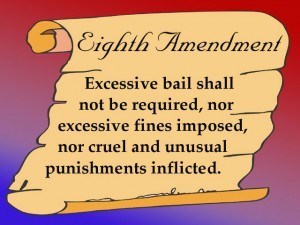Bail set at $5 million for Mollie Tibbetts murder suspect
I can’t agree with the bail/bond being set at $5 million cash-only in this case. While my prayers go to the family of Mollie Tibbetts as I have lived through this exact situation, my sister was also murdered; to charge a farm worker that amount of money is beyond excessive and appears to be only an attempt at pandering “Trumpism,” America’s irrational fear of brown/black skin and immagrants as well as a premeditated effort to use the news and social media to prejudice any future jury regarding the defendant. This excessive amount of bail almost surely guarantees that the defendant will experience the cruel and unusual punishment of most likely solitaire confinement until the trial.
[image error]
A judge has ordered a man charged in the kidnapping and murder of an Iowa college student to be jailed on a $5 million cash-only bond.
Cristhian Bahena Rivera had been held since Tuesday on a $1 million cash-only bond after being charged with first-degree murder in the death of the college student.
At a hearing Wednesday, Magistrate Judge Diane Crookham-Johnson granted a state prosecutor’s request to raise the bond amount to $5 million.
Assistant attorney general Scott Brown noted that Rivera is suspected of being in the country illegally, and is charged with a “heinous crime.” He says the higher bond amount would protect the community.
Rivera’s lawyer, Allan Richards, said he plans to ask for a bond review hearing at a later date. He said his client is a young man who has no prior criminal history and has worked for a prominent local farmer for years.
[image error]
The Eighth Amendment (Amendment VIII) of the United States Constitution prohibits the federal government from imposing excessive bail, excessive fines, or cruel and unusual punishments. The U.S. Supreme Court has ruled that this amendment’s Cruel and Unusual Punishment Clause also applies to the states.
The English Bill of Rights, from which the Eighth Amendment is based, did not determine the distinction between bailable and non-bailable offenses. Thus, the Eighth Amendment has been interpreted to mean that bail may be denied if the charges are sufficiently serious.
The Supreme Court has also permitted “preventive” detention without bail. In United States v. Salerno, 481 U.S. 739 (1987), the Supreme Court held that the only limitation imposed by the bail clause is that “the government’s proposed conditions of release or detention not be ‘excessive’ in light of the perceived evil.” In Stack v. Boyle, 342 U.S. 1 (1951), the Supreme Court declared that a bail amount is “excessive” under the Eighth Amendment if it were “a figure higher than is reasonably calculated” to ensure the defendant’s appearance at trial.
[image error]
Eighth Amendment: Banning Cruel and Unusual Punishment
august 18, 2014 by david j. shestokas
The Eighth Amendment to the US Constitution is part of the Bill of Rights.
Along with the Fourth, Fifth and Sixth Amendments it recognizes procedural rights for persons accused of crimes. The purpose of these procedural rights is to protect an individual’s inalienable natural right to liberty. When originally ratified in 1791, the Bill of Rights protections applied only to the federal government. The Fourteenth Amendment’s “Due Process Clause” extended these protections to individuals accused of crimes by state governments as well.
1641 Massachusetts Body of Liberties & 1776 Virginia Declaration of Rights
In 1641, The Massachusetts Bay Colony adopted a Body of Liberties with a right to bail and a prohibition on cruel and inhuman punishments. The Eighth Amendment’s language is virtually identical to the 1776 Virginia Declaration of Rights.
The Eighth Amendment reads as follows:
“Excessive bail shall not be required, nor excessive fines imposed, nor cruel and unusual punishments inflicted.”
[image error]
A defendant’s pre-trial detention is affected by the excessive bail clause. Excessive fines remain waiting a Supreme Court definition. Cruel and unusual punishment has been a major subject of Eighth Amendment litigation.
The Excessive Bail Clause
[image error]
A person accused of a crime is presumed innocent until found guilty at a trial or pleads guilty in open court. It is difficult to prepare a defense and consult with counsel while in custody.Bail is excessive when set at an amount higher than necessary to achieve a legitimate government purpose. If the purpose is to ensure a defendant’s appearance at trial, and if found guilty serve the sentence, then bail may not be set higher than needed to meet those ends.
To contest bail as excessive a defendant must ask for a reduction and if denied, appeal that decision. The Supreme Court has found that bail may be denied when it has been demonstrated that the defendant is a danger to the community.
[image error]
Factors Judicial Officer Must Take Into Consideration Regarding A Defendant’s Eligibility For Release:
When making a determination regarding the eligibility of a defendant for pretrial release (whether personal recognizance , unsecured appearance bond, or release on conditions), the judicial officer must consider the factors listed in Section 3142(g), including:
the nature and circumstances of the offense (in particular whether it is an offense which is violent or nonviolent in nature, or involves narcotics);
the weight of the evidence against the person;
the history and characteristics of the person —
character — including physical and mental condition), family ties, employment, financial resources, length of time in the community, community ties, past conduct history relating to drug or alcohol abuse, criminal history, record of court appearances; and
whether, at the time of the current offense or arrest, the person was on probation, on parole, or on other release pending trial, sentencing, appeal, or completion of sentence for an offense under Federal, State, or local law; and
the nature and seriousness of the danger to any person or to the community that would be posed by the person’s release.
18 U.S.C. § 3142(g). In addition to considering evidence of the factors set forth above, the court may upon its own motion, or upon the motion of the government attorney, conduct an inquiry into the source of any property to be designated for potential forfeiture or offered as collateral to secure any bond. 18 U.S.C. § 3142(g)(4). If the court determines that any such collateral or property, because of its source, will not reasonably assure the appearance of the defendant as required, the designation or use of the collateral or property as security for a bond shall be refused. 18 U.S.C. § 3142(g)(4).
[image error]
Innocent Until Proven Guilty, But Only If You Can Pay
How America’s bail system traps poor people in jail
[image error]
US’s Largest Organization of Lawyers Agrees That Courts Must Stop Treating People Like ATMs




